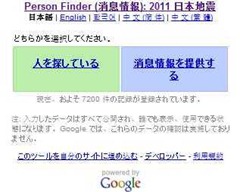 It’s well known that Google is one of the most-used websites all over the world, and is even seen as the main arbiter of information to most of the internet-enabled populace through it’s varied services. Vast and seemingly limitless in scope, the Google empire stretches across the internet-but what does it do with this power?
It’s well known that Google is one of the most-used websites all over the world, and is even seen as the main arbiter of information to most of the internet-enabled populace through it’s varied services. Vast and seemingly limitless in scope, the Google empire stretches across the internet-but what does it do with this power?
The most recent natural disaster, the March 11th Japanese earthquake, is quickly becoming an example of how Google shapes its response to real-world problems. In what ABC News says is “a first for Google”, the homepage has posted a tsunami alert, reading:
“Tsunami Alert for New Zealand, the Philippines, Indonesia, Papua New Guinea, Hawaii, and others. aves expected over the next few hours, caused by 8.9 earthquake in Japan.”
Breaking from its usually clean-and-simple look, the search engine giant seems to be harnessing its power for good, attempting to notify users the world over in the simplest, most direct fashion. This is fitting with the company’s ethos of “Don’t Be Evil”, but with all their resources, is this the best they can do?
Apparently not. Directly after the Magnitude 8.9 Earthquake, Google launched a new tool called “the Google Person Finder”. The user selects whether they are looking for a person, or whether they have information about a person. To find someone, simply enter their first and last name and you’ll see user-submitted entries containing your search terms. At the time of writing, the site lists about 6700 records.
In a test, the first search I entered showed a somber reality of this new tool; the report listed simply “drowned”.
This is only one part of Google’s overall response page, which has breaking news aggregated from social media and official news sources, videos, links to information message boards, useful maps, and emergency phone numbers.
While it may be true that Google has its ethics issues when it comes to privacy, the apparently unending trove of data that it collects can also be put to good use.
Sign up today to have our latest posts delivered straight to your inbox.